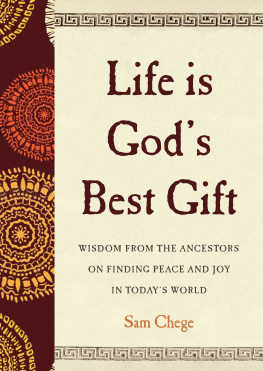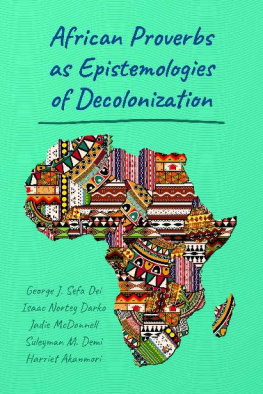I AM BECAUSE WE ARE
AFRICAN WISDOM IN IMAGE AND PROVERB

First edition of
I Am Because We Are: African Wisdom in Image and Proverb
Published in partnership with
Books For Africa whose goal is to end the book famine in Africa.
Books For Africa
253 East 4th Street Suite 200
St. Paul, MN, USA 55101
www.booksforafrica.org
Copyright Betty Press, 2011. All rights reserved.
Photographs copyright Betty Press, 2011. All rights reserved.
Foreword copyright Joanne Veal Gabbin, 2011. All rights reserved.
Introduction copyright Christiana Chinwe Okechukwu 2011. All rights reserved.
Afterword copyright Alison Nordstrm 2011. All rights reserved.
www.bettypress.com
www.africanwisdominimageandproverb.com
All rights reserved. No part of this book may be reproduced by any means, in any media, electronic or mechanical, including motion picture film video, photocopy recording or any other information storage retrieval system without prior permission in writing from the publisher.
Book design by Paul
Tynes www.paultynes.com
Printed by Oceanic Graphic Printing in China.
First edition 2011
ISBN: 978-0-9835454-4-6
Dedicated to the people of Africa who have taught us so much
wisdom through their proverbs.
Life is a proverb of creation.
African proverb

Contents
The title of the book comes from a well-known proverb I am because we are; we are because I am attributed to South Africa. It speaks to the interconnectedness and responsibility that we have for each other. It embodies the concept of Ubuntu, the African idea of living harmoniously in community.
The black and white photographs of unique moments in African daily life are combined with related proverbs to illustrate traditional African wisdom. Together they tell the story of life, moving through:
.
Finally, they come full circle with hope, as life goes on with the descendants and the living community.
Foreword
I Am Because We Are: African Wisdom in Image and Proverb is a stunning collection of photographs taken by Betty Press while she lived and traveled in Africa. One hundred and twenty-five photographs have been paired with African proverbs compiled by Annetta Miller, an American born in Tanzania and living in East Africa most of her life. In proverbs, philosophy and poetry have a fine marriage. Such is the relationship between Press black and white photographs and the proverbs that root these images in our collective mind and spirit. Though these images are of people living on another continent, speaking many different languages, living in different countries, and following diverse cultural rituals, we see them through the lens of the profound humanity that they represent. Betty Press allows us to be more than voyeurs. She takes us behind the eyes of a Peul girl who sees her beauty reflected in a small mirror; she takes us into the mind of a Sudanese boy whose ritual face paint cannot conceal his misgivings about his initiation into manhood. Her photographs fix in our minds communities that are vibrant and complex, filled with the drama of life that will bring tragedy and misery as quickly as joy.
I was immediately drawn to this book because of these striking photographs and the poetry that I found in abundance on these pages. A wise one said, Proverbs are the palm oil with which words are eaten. Proverbs, like poems, are concise, loaded with metaphors, wisdom, nuance, and the rhythms of life. In this volume language is best digested with proverbs. When I read one of the proverbs in this collection: Better a piece of bread with a happy heart than wealth with grief, I recalled that my mother would often say, Better to have a morsel of bread in peace than a banquet in confusion. I realized that the philosophical foundations that I stand upon were delivered in these cogent bits of advice throughout my upbringing. When it rains, it pours was my fathers explanation for troubles that seemed to trip over each other in bringing us misfortune. On the eve of my wedding, my mother, who was demure, especially when speaking of sexual relationships, gave me this cryptic piece of advice: Always keep something covered or you will become as a sister to him. With each passing year, I review her words and marvel at the wisdom she packed into them, words that have served me well for more than forty years of marriage.
Toi Derricotte writes in one of her poems, poems do that sometimestake /the craziness and salvage some/small clear part of the soul. Proverbs have in their very nature the idea that the collective conscience of the community is weighed in every line. Perhaps that is why this book has such an attraction for me because the photographs capture time as images and the proverbs take me home to a place that nourishes the soul. Take for example the cover photograph which shows the genius of the photographers technique. As we survey three Senegalese women, their radiant shoulders and glinting gold jewelry that decorates their ears, our gaze is drawn to the woman with penetrating and kind eyes. The batik designs that drape their bodies and adorn their heads add a beauty that almost competes with the cherub-faced child in the background. This photograph hints at the chaos that frames these women and salvages radiance, mystery, happiness, and hope for the future in the essence of its message.
In this collection, the message is significant and life-affirming: I am because we are; we are because I am. We exist in community with a multiplicity of voices, and we thrive because we share the responsibility for that community with others. When Annetta Miller heard the Kenyan proverb: Treat the earth well; it was not given to you by your parents, but was loaned to you by your children, she must have wondered about the mind who created it. In it is the wisdom of griots who have traced the lineage of their people, told the stories of their ancestors, and passed them on to their children. The power of this collection is that we are able to see the engaging images of the heirs of this wisdom and hear the voices of continuity, identity, and legacy that affirm their communal spirit.
Joanne Veal Gabbin
Executive Director of the Furious Flower Poetry Center
Professor of English at James Madison University, Harrisonburg, Virginia
Introduction
Proverbs are the palm oil with which words are eaten (Chinua Achebes Things Fall Apart); they are aphorisms that capsulate a peoples explanation of the origin of the universe. They deal with views on life and existence, being, friendship, values, love, human relations, death, concepts of time: temporality and historicity. More importantly, they are pungent rhetorical weapons used to include and exclude in many cultures. Thus Igbo people have a proverb that says, a tuolu omalu omalu, mana a tuolo ofeke, ofelu isi tinye na-ofia. This means when you use a proverb to talk to the wise, the wise will understand fully, but when you use a proverb to talk to the ofeke (the worthless individual) it will be lost on the person.
The proverbs in this volume, selected by life-long resident of Africa Annetta Miller, succinctly capture the concepts of age, existence, friendship, honesty, knowledge, life and existence, punctuality, respect, temporality, the cyclical nature of time, existence as a continuum, intrusion into space, the fragility of the earth/ environment, the configuration of spatiality in relation to society as a unit, the individual vs. the society, value for human beings above wealth, etc. These proverbs carry the burden of the philosophy of the group from which they emanate. Miller has the African society being dealt with by taking cognizance of the pithy nature of the proverbs to avoid being confounded in an attempt to comprehend the people whose worldview is embodied in these proverbs. Africa is rich in these proverbs.







